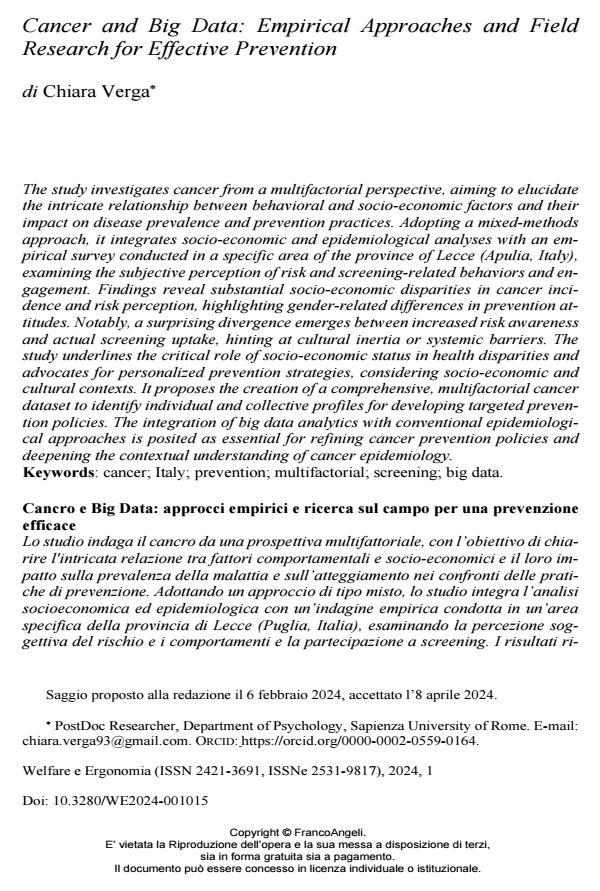Cancer and Big Data: Empirical Approaches and Field Research for Effective Prevention
Titolo Rivista WELFARE E ERGONOMIA
Autori/Curatori Chiara Verga
Anno di pubblicazione 2024 Fascicolo 2024/1
Lingua Inglese Numero pagine 49 P. 197-245 Dimensione file 1202 KB
DOI 10.3280/WE2024-001015
Il DOI è il codice a barre della proprietà intellettuale: per saperne di più
clicca qui
Qui sotto puoi vedere in anteprima la prima pagina di questo articolo.
Se questo articolo ti interessa, lo puoi acquistare (e scaricare in formato pdf) seguendo le facili indicazioni per acquistare il download credit. Acquista Download Credits per scaricare questo Articolo in formato PDF

FrancoAngeli è membro della Publishers International Linking Association, Inc (PILA)associazione indipendente e non profit per facilitare (attraverso i servizi tecnologici implementati da CrossRef.org) l’accesso degli studiosi ai contenuti digitali nelle pubblicazioni professionali e scientifiche
The study investigates cancer from a multifactorial perspective, aiming to eluci-date the intricate relationship between behavioral and socio-economic factors and their impact on disease prevalence and prevention practices. Adopting a mixed-methods approach, it integrates socio-economic and epidemiological analyses with an empirical survey conducted in a specific area of the province of Lecce (Apulia, Italy), examining the subjective perception of risk and screening-related behaviors and engagement. Findings reveal substantial socio-economic disparities in cancer incidence and risk perception, highlighting gender-related differences in prevention attitudes. Notably, a surprising divergence emerges be-tween increased risk awareness and actual screening uptake, hinting at cultural inertia or systemic barriers. The study underlines the critical role of socio-economic status in health disparities and advocates for personalized prevention strategies, considering socio-economic and cultural contexts. It proposes the cre-ation of a comprehensive, multifactorial cancer dataset to identify individual and collective profiles for developing targeted prevention policies. The integration of big data analytics with conventional epidemiological approaches is posited as essential for refining cancer prevention policies and deepening the contextual understanding of cancer epidemiology.
Parole chiave:cancer; Italy; prevention; multifactorial; screening; big data.
Chiara Verga, Cancer and Big Data: Empirical Approaches and Field Research for Effective Prevention in "WELFARE E ERGONOMIA" 1/2024, pp 197-245, DOI: 10.3280/WE2024-001015